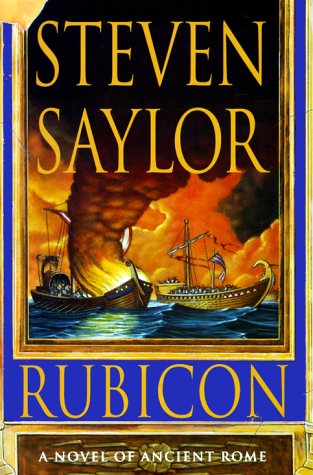I received this book for free from in exchange for an honest review. This does not affect my opinion of the book or the content of my review.

Catilina's Riddle
by
Steven Saylor
historical mystery in Paperback edition that was published by Minotaur Books on February 18, 2002 and has 496 pages.
Explore it on Goodreads or Amazon
Other books by this author which I have reviewed include Arms of Nemesis, Seven Wonders, The Venus Throw, The House of the Vestals, A Murder on the Appian Way, Rubicon, Last Seen in Massilia, A Mist of Prophecies
Third in the Roma Sub Rosa ancient Rome historical mystery series revolving around Gordianus the Finder. It’s seventeen years since Roman Blood, 1.
Catilina’s Riddle was a nominee for the Hammett Prize and the Lambda Literary Award for Gay Men’s Mystery in 1993 and the Dilys Award in 1994.
My Take
I have to confess this one was tedious, and I kept putting it down. Although, I did love the sound of his farm and the baths…and Gordianus’ library…lovely…
Saylor educates us on the mechanics of campaigning and politics in Rome. And, yes, there’s graffiti to protest one candidate or another. It seems the primary purpose of being elected to office is to enable the officeholder to “bleed enough taxes from the locals” to enrich him. So, nothing much has changed over the past 2,000 or so years.
It’s also eye-opening to read of the proper behavior of a son, a wife, a daughter to the patriarch of the house. — Thank you for today’s manners! — The rituals surrounding a young man’s coming-of-age celebration. It’s also eye-opening how poorly the Claudii behave.
Poor Gordianus. His dreams are conflicted as is his younger son. It’s a universal blindness that has come down through the ages, that of a father who refuses to see that his son has grown up. That of a son who is frustrated that his father does not see or treat him as an adult. And yet it is the bright spot in all this: it’s Meto’s coming of age day. Well worth a celebration.
“…when he left the room just now, it wasn’t worry I was feeling. I was feeling rather proud of him, actually — and a little ashamed of myself.”
I don’t understand why Cicero’s bodyguards come pounding on Gordianus’ door. After events are explained, I agree wholeheartedly with Gordianus about staying away from Cicero. What a schmuck!
God, what a character! Has no shame in plotting and planning. Killing and poisoning and kidnapping. Such greed! And no regret at all… This person seems so typical of the time, and when you think of all that the Romans have, how “civilized” they are…well, it’s just too scary.
How very political of Cicero:
“Change is the enemy of civilization, Gordianus. What is the point of innovation, when things are already in the hands of the Best People? What you might consider progress can only be decay and decadence.”
Words that finally sound like the truth from his lips. Unlike his campaigning speeches…
The Story
Luck finds Gordianus living the country life on an amazing farm. It couldn’t have come at a better time for Gordianus is fed up with the corruption and lies in Rome. He wants the simple life. Only, life is too simple and too dangerous.
Especially when Cicero calls in a favor in this election month: for Gordianus to play host to his enemy. When Gordianus balks, a sign appears. A headless man. With his family to think of, Gordianus concedes only to plunge ever deeper.
The Characters
Gordianus the Finder has inherited an Etruscan farm from his friend, Lucius Claudius, and has moved his family to the country. Yep, family, for Gordianus freed Bethesda when she got pregnant, and then he married her. Mummius (from Arms of Nemesis, 2) rescued Meto, and Gordianus adopted him as his son as well; he’ll be sixteen in a few days. They also have a little six-year-old girl, Gordiana whom they call “Diana“. Aratus is the farm foreman, a slave, and not very happy with Gordianus’ anxieties. Congrio is their excellent cook.
Eco, his adopted son, is 26 and now lives on the Esquiline Hill with his new very tactful wife, Menenia. Belbo is now Eco’s guard.
Claudia Claudius is Gordianus’ neighbor on the farm next door and Lucius’ cousin, and the only Claudii to accept Gordianus; Publius, Manius, and Gnaeus are the male cousins who surround and harass Gordianus. The entire family is upset that Lucius willed the farm — the best in the family — outside the family and even more upset that Cicero won in court for Gordianus. Dragonfly is Publius’ sex slave. He certainly has some disgusting notions… Gnaeus is the one with the silver mine on his almost useless property. Forfex is his head goatherder. Manius is a bigot and kleptomaniac.
Marcus Caelius is, off and on, a protégé of Cicero’s and Crassus’ and spying on Catilina for Cicero. Cicero is a consul of Rome now, and Gordianus is disgusted with his machinations to gain office and while in office. Quintus is Cicero’s brother.
Lucius Sergius Catilina is opposed to Cicero and running in this election for consul. Gordianus is cautious around him for his reputation says he is a man of varied appetites. Gaius Manlius, a military man in Faesulae, is Catilina’s principal ally outside of Rome. Tongilius is Catilina’s companion and informs Gordianus, jokingly, that telling riddles is Catilina’s only vice. Yeah, right… some of Catilina’s sillier cronies include Lentulus Cornelius and Cethegus; others include Sulla’s old supporters, including Sulla’s grandsons. Aurelia is Catilina’s wife.
Crassus is Rome’s wealthiest man; we first met him in Roman Blood with more intimate dealings in Arms of Nemesis. Marcus Valerius Messalla Rufus from Roman Blood is one of the augurs and is running for praetor this year. He aligned with Julius Caeser, the current Pontifex Maximus, the head of the state religion.
Marcus Mummius (from Arms of Nemesis) was once one of Crassus’ protégés, and now he looks to Pompey. Apollonius is still with Mummius. Nemo is Nobody, a headless man buried in a grave. The Allobroges are a tribe in Gaul unhappy with how Rome treats them.
The Cover and Title
The cover of the version I read is a set of abstract blocks framing a split-screen of a few senators seated in the Roman Senate on the left, and a bust of Cicero? on the right. The blocks which frame it on top and bottom hold the title, the author’s name, and taglines.
The title reflects the mysteries posed within, puzzles as a result of the antagonist’s love for teasers, Catilina’s Riddle.















